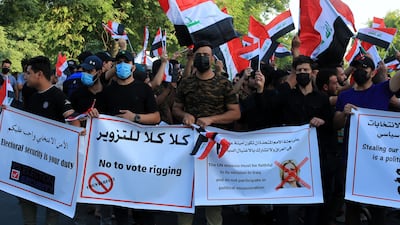Iraq’s Independent High Election Commission (IHEC) has received 1,372 appeals contesting the results of this month’s early national elections, an official told The National on Wednesday.
Emad Jamil Muhsin, of the IHEC media team, said the Board of Commissioners has seven days to look into the appeals before sending them to the Judicial Commission.
The Commission has 10 days to study the documents, Mr Muhsin said.
Once all appeals are cleared by the Judicial Commission, the results will be sent to the High Federal Court for ratification, he said, after which Iraqi President Barham Salih will have 15 days to call for the new Parliament to convene.
Mr Muhsin ruled out any major change to the announced results.
“The appeals are highly unlikely to lead to big changes in the nationwide results, but sometimes could change results in a single constituency as the differences between candidates are three to five votes,” Mr Muhsin said.
The deadline for complaints to be received was on Tuesday.
A political group sponsored by the Shiite cleric Moqtada Al Sadr, known as the Sadrist bloc, was the clear winner in the elections on October 10, with 73 seats in the 329-member Parliament.
Sunni Parliament Speaker Mohammed Al Halbousi’s Taqadum group won 37 seats, while former prime minister Mr Al Maliki’s State of Law bloc was third with about 35.

Iran-backed Fatah Alliance, which is made up mainly of Shiite militias, faced a major blow, winning only 14 seats, significantly fewer than the 48 seats it secured in 2018 elections.
Independent candidates are expected to control 30 to 50 seats. The leader of Fatah Alliance, Hadi Al Amiri, as well as Mr Al Maliki and several Shiite parties have rejected the results and are demanding manual recount for all ballots. Some say they have evidence of manipulation.
Hundreds of their supporters have been protesting in Baghdad. On Sunday, demonstrators burnt tyres and blocked roads south and north of Baghdad. Since then, the protests have been peaceful.
On Tuesday, they gathered in the capital's Jadriyah neighbourhood near one of the entrances to the heavily fortified Green Zone where high offices for the government and IHEC are located.
"No to fraud, no to America," chanted protesters who had set up tents for the sit-in, AFP reported.
Recount unlikely
"The results that were announced were rigged," said Ahmed Salman, a 23-year-old day labourer who was helping to put up a tent. "We'll stay here until they give back the votes they stole from us."
But Mr Muhsin said recounting ballots was unlikely.
“Today, IHEC has finished its work and the decision to recount the votes is not in its hands," he said. "But the Judicial Commission has the right to decide whether to recount votes in specific ballot boxes or polling centres only if it is convinced by the appeals.
“The decision to recount the votes for all Iraq is only in the hands of the High Federal Court. We think this is not possible since till now there is no clear evidence of manipulation in all the country."
Holding early election was among crucial demands by the pro-reform protest that engulfed the country in October 2019. At least 167 parties and more than 3,200 candidates competed for 329 seats.
There was a relatively low turnout of 43 per cent, down from the 44.5 per cent registered during the previous election in 2018.


